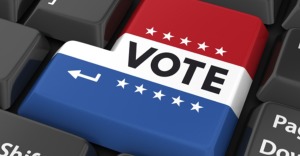>> It’s election season, and it feels like everyone is vying for a piece of your vote. We live in an era of complete electoral information overload—the TV airwaves have been taken over by political advertisements, yard signs crowd every traffic intersection, and the news cycle is dominated by debates, mudslinging, and endorsements.
It’s election season, and it feels like everyone is vying for a piece of your vote. We live in an era of complete electoral information overload—the TV airwaves have been taken over by political advertisements, yard signs crowd every traffic intersection, and the news cycle is dominated by debates, mudslinging, and endorsements.
Daunted by the glut of information, Chapel Hill voter Elena Lebetkin decided this year to take an unconventional approach to her political research: She crowdsourced her vote.
“Can someone in NC who understands legal-talk please explain why I should or shouldn’t vote for the constitutional amendment on the ballot?” Lebetkin wrote on her Facebook wall. Like many people, she was struggling to understand >>a proposed change to the state Constitution that would allow a criminal defendant to waive his or her right to a jury trial.
As social media pervades our collective consciousness, it only stands to reason that its reach moves beyond baby pictures and memes to serve as an information gathering platform. Who hasn’t asked their virtual sounding board to help them pick a restaurant or find a babysitter? But is it the right platform for a decision as serious as how to mark your ballot?
During the recent Scottish vote to decide on the issue of independence, >>more than a third of voters said social media played the most influential role in deciding their vote, with more than half of voters turning to sites like Twitter and Facebook for election information. In the US, >>a 2010 study showed that seeing friends announce votes on Facebook led to far higher rates of voter participation.
Getting encouragement to head to the polls from a Facebook post seems harmless. But what about asking who to vote for? Ali Nininger-Finch, a Durham resident attending law school out of state, recently asked her 522 Facebook friends how to vote in November’s general election. She sought advice on the judicial candidates as well as the constitutional amendment.
“I think this election was a particularly choice one to crowdsource because of the constitutional amendment,” Nininger-Finch said, explaining her decision to seek help. “The folks within my bubble don’t all agree on it, so it was really interesting get to hear actually legitimate arguments on both sides of an issue.”
She received diverse advice, including some redirection to several large papers’ endorsements and articles on the issues. Nininger-Finch said she typically relies on endorsements to guide her vote, but living out of state led her to want to touch base with local voters as well.
>>Ballots in this year’s general election can be particularly complicated for some voters. >>Straight party voting has been outlawed, so voters must mark each candidate individually. In addition to the amendment, in Orange County I have a US Senate seat, four Supreme Court judges, and four Appeals Court judges to choose. The judge races can be particularly difficult to understand. Several Facebook friends—including local elected officials—have posted lists of judicial candidates they plan to vote for.
Chapel Hill mayor >>Mark Kleinschmidt publicly announced his picks and wrote on Facebook, “Folks frequently ask me about judicial races. It’s imperative we be as educated as possible about voting for these important office holders. For non-lawyers, I know it can be difficult to decide. But these races are as important as any in the ballot.”
It’s nice to receive guidance, but how can a voter figure out if someone’s voting advice is well researched and worth following? The answer is unclear. Nininger-Finch said she had to carefully consider her relationship with someone before following their voting advice.
“I have a bunch of random Facebook friends I’ve met once at various events whose opinions I don’t necessarily trust who responded to my post,” she said. “That could have been a time-waster, trying to figure out whether I agreed with their responses.”
Well before the age of social media, even before computers, friends were relying on friends to help guide their vote. Everyone knows at least one person who seems to be plugged in, whose opinion on everything from vacation rentals to presidential candidates is trustworthy. >>Used with discretion, Facebook can just be an extension of that type of relationship.
Traditionally voters say they receive the bulk of their information from TV and radio advertisements. This year >>millions of dollars have been spent by out-of-state PACs and other special interests, all trying to influence voters in the race for an open US Senate seat. With so much airtime given to organizations outside North Carolina, in some ways social media might be the only way to keep your voting research local and relevant.
How do you decide who to vote for? Have you ever crowdsourced your vote? Let us know in the comments below or >>on Facebook!
There are no comments
Add yours